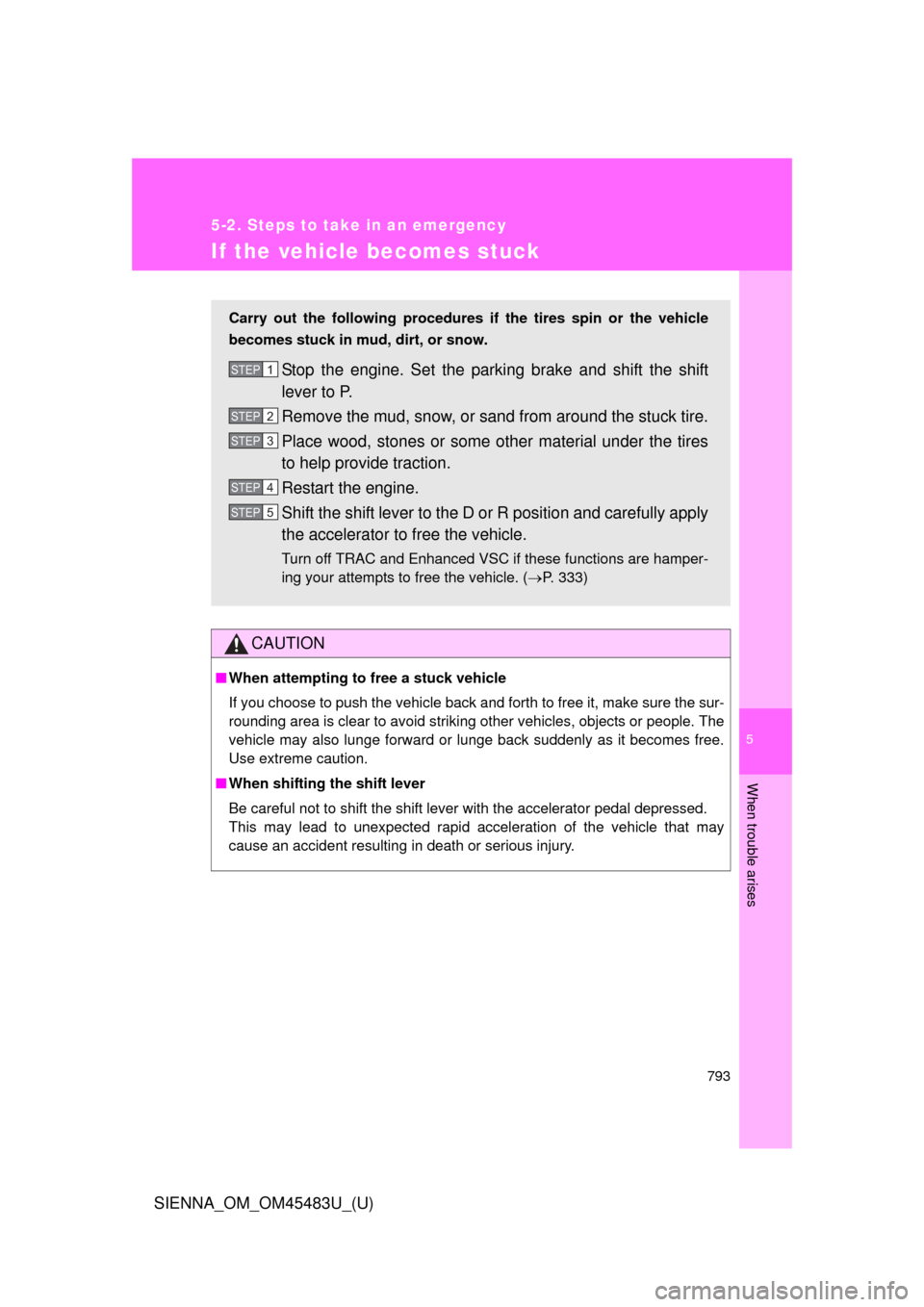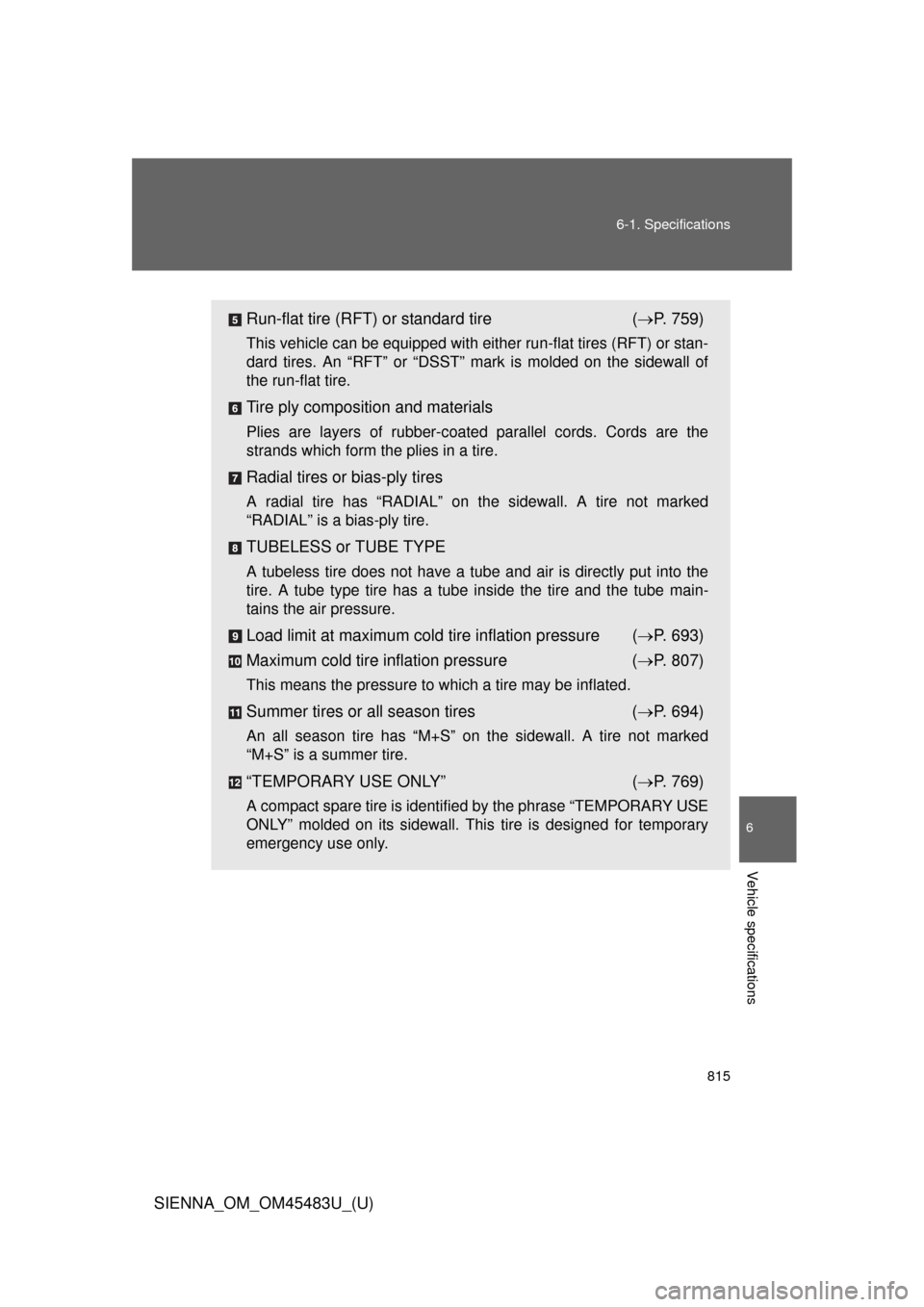Page 774 of 872

774 5-2. Steps to take in an emergency
SIENNA_OM_OM45483U_(U)
CAUTION
■Replacing a flat tire for vehicles with power sliding door and/or
power back door
In cases such as when re placing tires, make sure to turn off the power
sliding door main switch ( P. 70) and/or the power back door main
switch ( P. 84). Failure to do so may cause the sliding door and/or the
back door to operate unintentionally if the power sliding door switch and/
or the power back door switch is ac cidentally touched, resulting in hands
and fingers being caught and injured.
■When stowing the flat tire
●Make sure the third seats ar e in their original position.
●Secure it using a tire strap. Otherwis e, the flat tire may fly out in case
of sudden braking or an accident, resulting in death or serious injury.
NOTICE
■When loosening or tightening the spare tire clamp bolt
Do not use an impact wrench. Use the adapter socket and jack handle.
■Do not drive the vehicle with a flat tire
Do not continue driving with a flat tire.
Driving even a short distance with a flat tire can damage the tire and the
wheel beyond repair.
■Be careful when driving over bumps with the compact spare tire
installed on the vehicle
The vehicle becomes lower when driving with the compact spare tire
compared to when drivin g with standard tires. Be careful when driving
over uneven road surfaces.
Page 775 of 872

5
When trouble arises
775
5-2. Steps to take in an emergency
SIENNA_OM_OM45483U_(U)
NOTICE
■Driving with tire chains and the compact spare tire
Do not fit tire chains to the compact spare tire.
Tire chains may damage the vehicle body and adversely affect driving
performance.
■When replacing the tires
When removing or fitting the wheels, tires or the tire pressure warning
valve and transmitter, contact your
Toyota dealer as the tire pressure
warning valve and transmitter may be damaged if not handled correctly.
■To avoid damage to the tire pressure warning valves and transmit-
ters
When a tire is repaired with liquid sealants, the tire pressure warning
valve and transmitter may not operate properly. If a liquid sealant is
used, contact your Toyota dealer or other qualified service shop as soon
as possible. Make sure to replace the tire pressure warning valve and
transmitter when replacing the tire. ( P. 690)
■After taking out or stowing the spare tire
Make sure to secure the tire carrier by tightening the clamp bolt to pre-
vent the holding bracket from hitting the under body of the vehicle during
driving.
■Using the tire carrier
●As the tire carrier is designed fo r use with the compact spare tire, it
cannot be used with standard tires.
●If the spare tire is flat, do not use th e tire carrier, as the tire may not be
held securely.
Page 793 of 872

5
When trouble arises
793
5-2. Steps to take in an emergency
SIENNA_OM_OM45483U_(U)
If the vehicle becomes stuck
CAUTION
■When attempting to free a stuck vehicle
If you choose to push the vehicle back and forth to free it, make sure the sur-
rounding area is clear to avoid striki ng other vehicles, objects or people. The
vehicle may also lunge forward or lu nge back suddenly as it becomes free.
Use extreme caution.
■ When shifting the shift lever
Be careful not to shift the shift lever with the accelerator pedal depressed.
This may lead to unexpected rapid acceleration of the vehicle that may
cause an accident resulting in death or serious injury.
Carry out the following procedures if the tires spin or the vehicle
becomes stuck in mud, dirt, or snow.
Stop the engine. Set the parki ng brake and shift the shift
lever to P.
Remove the mud, snow, or sand from around the stuck tire.
Place wood, stones or some other material under the tires
to help provide traction.
Restart the engine.
Shift the shift lever to the D or R position and carefully apply
the accelerator to free the vehicle.
Turn off TRAC and Enhanced VSC if these functions are hamper-
ing your attempts to free the vehicle. (P. 333)
STEP1
STEP2
STEP3
STEP4
STEP5
Page 807 of 872
807
6-1. Specifications
6
Vehicle specifications
SIENNA_OM_OM45483U_(U)
Tires and wheels
17-inch tires
18-inch tires
19-inch tires
Tire size P235/60R17 100T
Tire inflation pressure
(Recommended cold tire
inflation pressure)Front: 35 psi (240 kPa, 2.4 kgf/cm2 or bar)
Rear: 35 psi (240 kPa, 2.4 kgf/cm2 or bar)
Wheel size 17 x 7J
Wheel nut torque76 ft•lbf (103 N•m, 10.5 kgf•m)
Tire size P235/55R18 99V, P235/55RF18 99T
Tire inflation pressure
(Recommended cold tire
inflation pressure)Front: 35 psi (240 kPa, 2.4 kgf/cm2 or bar)
Rear: 35 psi (240 kPa, 2.4 kgf/cm2 or bar)
Wheel size 18 x 7J
Wheel nut torque76 ft•lbf (103 N•m, 10.5 kgf•m)
Tire size P235/50R19 99V
Tire inflation pressure
(Recommended cold tire
inflation pressure)Front: 36 psi (250 kPa, 2.5 kgf/cm2 or bar)
Rear: 36 psi (250 kPa, 2.5 kgf/cm2 or bar)
Wheel size 19 x 7J
Wheel nut torque76 ft•lbf (103 N•m, 10.5 kgf•m)
Page 815 of 872

815
6-1. Specifications
6
Vehicle specifications
SIENNA_OM_OM45483U_(U)
Run-flat tire (RFT) or standard tire
( P. 759)
This vehicle can be equipped with eit her run-flat tires (RFT) or stan-
dard tires. An “RFT” or “DSST” mark is molded on the sidewall of
the run-flat tire.
Tire ply composition and materials
Plies are layers of rubber-coated parallel cords. Cords are the
strands which form the plies in a tire.
Radial tires or bias-ply tires
A radial tire has “RADIAL” on the sidewall. A tire not marked
“RADIAL” is a bias-ply tire.
TUBELESS or TUBE TYPE
A tubeless tire does not have a tube and air is directly put into the
tire. A tube type tire has a tube inside the tire and the tube main-
tains the air pressure.
Load limit at maximum cold tire inflation pressure ( P. 693)
Maximum cold tire in flation pressure ( P. 807)
This means the pressure to which a tire may be inflated.
Summer tires or all season tires ( P. 694)
An all season tire has “M+S” on the sidewall. A tire not marked
“M+S” is a summer tire.
“TEMPORARY USE ONLY” ( P. 769)
A compact spare tire is identified by the phrase “TEMPORARY USE
ONLY” molded on its sidewall. This tire is designed for temporary
emergency use only.
Page 818 of 872
818 6-1. Specifications
SIENNA_OM_OM45483U_(U)
Tire section namesBead
Sidewall
Shoulder
Tread
Belt
Inner liner
Reinforcing rubber
Carcass
Rim lines
Bead wires
Chafer
Uniform Tire Quality GradingThis information has been prepared in accordance with regulations
issued by the National Highway Tr affic Safety Administration of the
U.S. Department of Transportation.
It provides the purchasers and/or prospective purchasers of Toyota
vehicles with information on uniform tire quality grading.
Your Toyota dealer will help answ er any questions you may have as
you read this information.
■ DOT quality grades
All passenger vehicle tires mu st conform to Federal Safety
Requirements in addition to these grades. Quality grades can be
found where applicable on the tire sidewall between tread shoulder
and maximum section width.
For example: Treadwear 200 Traction AA Temperature A
ITY61C013
Page 819 of 872

819
6-1. Specifications
6
Vehicle specifications
SIENNA_OM_OM45483U_(U)
■
Treadwear
The treadwear grade is a comparative rating based on the wear
rate of the tire when tested under controlled conditions on a speci-
fied government test course.
For example, a tire graded 150 would wear one and a half (1-1/2)
times as well on the government course as a tire graded 100.
The relative performance of tires depends upon the actual conditions
of their use, performance may differ significantly from the norm due
to variations in driving habits, service practices and differences in
road characteristics and climate.
■ Traction AA, A, B, C
The traction grades, from highest to lowest, are AA, A, B and C,
and they represent the tire’s ab ility to stop on wet pavement as
measured under controlled cond itions on specified government
test surfaces of asphalt and concrete.
A tire marked C may have poor traction performance.
Warning: The traction grade assigned to this tire is based on braking
(straight ahead) traction tests and does not include cornering (turn-
ing) traction.
Page 820 of 872
820 6-1. Specifications
SIENNA_OM_OM45483U_(U)■
Temperature A, B, C
The temperature grades are A (the highest), B, and C, represent-
ing the tire’s resistance to the generation of heat and its ability to
dissipate heat when tested under controlled conditions on a speci-
fied indoor laboratory test wheel.
Sustained high temperature can cause the material of the tire to
degenerate and reduce tire life, and excessive temperature can lead
to sudden tire failure.
The grade C corresponds to a level of performance which all passen-
ger car tires must meet under the Federal Motor Vehicle Safety Stan-
dard No. 109.
Grades B and A represent higher levels of performance on the labo-
ratory test wheel than the minimum required by law.
Warning: The temperature grades of a tire assume that it is properly
inflated and not overloaded.
Excessive speed, underinflation, or excessive loading, either sepa-
rately or in combination, can cause heat buildup and possible tire fail-
ure.